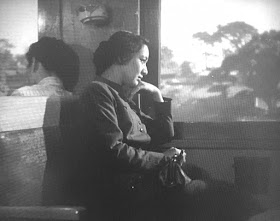(All images are details from iPhone photos taken of the film playing from the FilmStruck app on Apple TV; built-in screen-capturing is disabled during playback from the Web and from the FilmStruck app on iPhone/iPad.)
Prefatory note: The go-to reference work in English about Naruse's films is Dan Sallitt's A Mikio Naruse Companion: Notes on the Extant Films, 1931-1967, which exists as a WordPress site accessible from the link. I've been reading his entries on each film after my initial viewing, and have been enjoying tremendously the lucid and sensitive considerations he's drawn from his own viewings over the years.
Financial clerk Hatsunosuke (Ken Uehara) is married to Michiyo (Setsuko Hara), housewife. The thirty-something couple reside in a small Osaka two-story centrally located on a narrow lane adjacent to the main road; the neighbors stop by daily to share neighborhood news or request neighborly favors. One afternoon, Hatsunosuke's 20-year-old niece Satoko (Yukiko Shimazaki) arrives unexpectedly in town on the train from Tokyo to take an extended (unannounced) holiday in the household of her favorite father's-brother, escaping in the process a marriage offer she's not seriously considering.
Money pressures have weighed upon the couple; rather, have pressed upon pecuniary-minded Michiyo more than active-earner Hatsunosuke. Childless, the two make do on the salary of the husband, who had been promised prospects at his current post greater than have yet come to fruition. His secretary packs a more fulfilling bentô lunch than he does. On a rare afternoon, Michiyo leaves the zone of her washing room / de facto kitchen/pantry (designated as her zone by its cardinally framed recession up-stage in Naruse's recurring master-shot of the living room) and splurges to attend a reunion with her school friends for ¥100. The lunch is brief, given that most of the other attendees have been called away by their day-duties to their families and children.
Michiyo runs into a handsome single cousin, Kazuo (Hiroshi Nihon'yanagi), who offers to lend her the money for her Tokyo trip. We perceive Michiyo's scrimping and saving maybe as almost pathological, an assessment made difficult to gauge without qualification by her husband's own supreme indifference and lassitude.
It's hard to empathize with any of the main characters of Meshi [Repast, 1951] — especially to do so with protagonist Michiyo, the star typed here as the harried and suspicious housewife, but it's easy to take her as a complete bitch... Then again, the viewer recalls her situation, that she's likely been dealt her lot-in-life by way of a parentally-arranged marriage. 'Cattiness,' as in Naruse's previous '51 picture, Ginza Makeup: while Michiyo is out with the girls, Satoko greets Hatsunosuke home from the office. They flirt, he pings her on the forehead (Naruse makes a glorious cut-on-action here from a medium two-shot to the full-shot). Laying down she's overcome with a nosebleed he consequently attends to. She goes to sleep without having prepared the evening meal she'd promised the couple.
Michiyo packs up and leaves for Tokyo, accompanied by Satoko her albatross who figures it wise to return to her parents, even as in chance parallel Michiyo is returning to her own for the purpose of spousal hiatus. In the course of the train ride, who appears but Cousin Kazuo; Michiyo grows visibly perturbed by the advances made on Satoko's part to her finely groomed and chiseled blood-relative. She resents Satoko's carefree approach to life and love, and her indifference to a marriage proposal (arranged or not?) that awaits in Tokyo. As with the 'weirdness' between her husband and his niece, so exists a tension-on-crush for Michiyo towards her cousin.
Once in Tokyo, Michiyo's brother quickly disabuses her of the decision to reintegrate even briefly into the nuclear family, on the basis of a disruption to their own routine while she works through her own situation, having taken leave from the marriage house and in search of work. The final act, out of a contemporary Hollywood picture, heralds a typhoon that disrupts the already unsettled house with restless sleep and structural damage to the home.
Shortly after Satoko wonders aloud to Michiyo that, "It would make you and Hatsunosuke happy if I married Kazuo, right?", the elder woman erupts into a crazed laughter upon which Naruse punctuates the scene. Hatsunosuke arrives in Tokyo, cowed, or chastened, or whatever suggests an equivalent more invisible. A pair of street-troupers gambol down a lane (just as in Ginza Makeup) providing an interlude of relief from the bittersweet drama at hand. Hatsunosuke explains that he's found new income — his uncle has given him a job offer, and the prospect of increased income, money is reignited.
The couple boards the train back to Osaka, and Michiyo's internal monologue returns in voice-over narration (taken from text from the Hayashi source novel?) for the third time in the film, following the opening and her arrival in Tokyo: "...as we share our lives together in search of happiness: perhaps that is what true happiness means to me."
More writing at Cinemasparagus on the films of Mikio Naruse:
Nasanu-naka [No Blood Relation, 1932]
Kimi to wakarete [Apart from You, 1933]
Yogoto no yume [Every-Night Dreams, 1933]
Kagirinaki hodô [Endless Pavement, 1934]
Ginza keshô [Ginza Makeup, 1951]






No comments:
Post a Comment
Note: Only a member of this blog may post a comment.